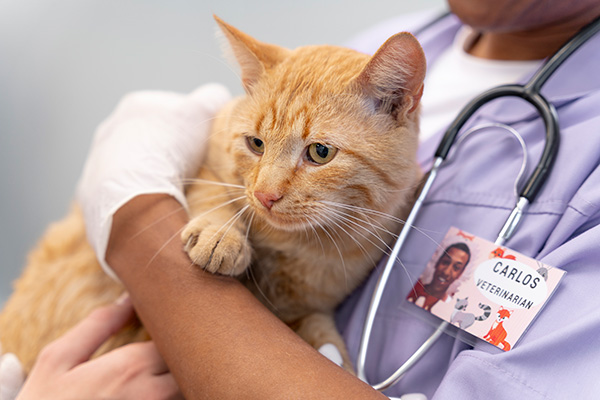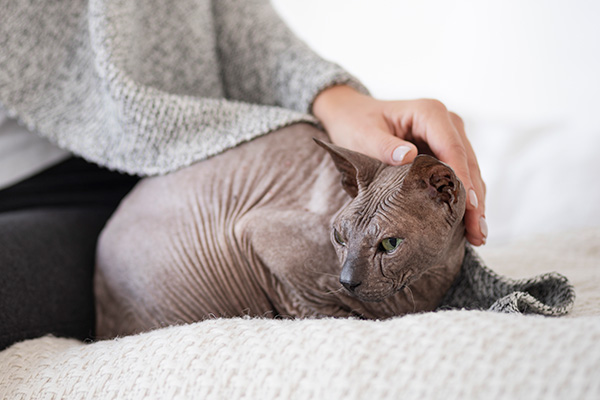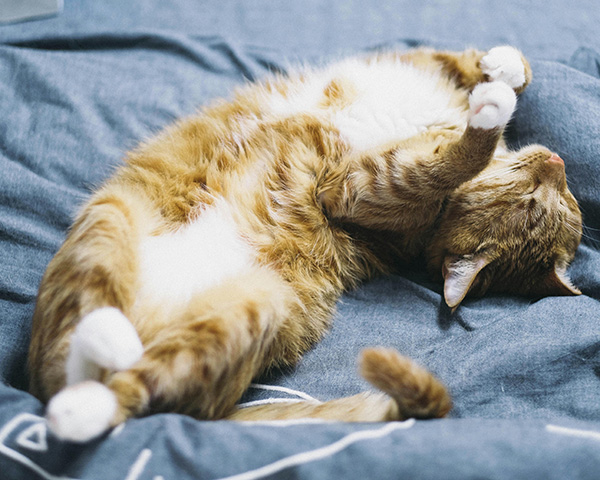Finding cat urine on your bed can be a distressing and frustrating experience for pet parents. Additionally, eliminating the cat pee smell can be challenging. While alarming, this behavior is common among cats and signals that looking beyond the surface is crucial to understanding the underlying causes.
Whether due to medical issues, stress, or environmental factors, each reason requires a different approach to address effectively. By identifying the root causes, cat owners can implement targeted solutions to help their furry friends overcome this unsettling behavior. To foster a harmonious living environment for you and your cat, it's important first to understand the reasons behind your cat's behavior.
8 Reasons Your Cat is Peeing on The Bed
Medical Issues

When your cat unexpectedly starts peeing on your bed, it could signal an underlying medical issue requiring attention. Inappropriate urination in cats can be caused by various health issues, including urinary tract infections (UTIs), bladder stones, diabetes, kidney disease, or hyperthyroidism. These conditions can make urination painful or increase the frequency and urgency, prompting your cat to choose the bed—a spot they associate with comfort.
Identifying these issues often starts with observing additional symptoms: Is your cat urinating more frequently, showing signs of pain like meowing or licking excessively during urination, or have there been changes in its drinking habits? If you notice any of these signs, it is important to take your cat to the veterinarian.
Addressing these medical conditions typically involves a combination of medications to treat the specific illness and adjustments in-home care. Your vet may recommend dietary changes, increased water intake, or specific medications. Antibiotics or dietary adjustments can resolve symptoms in cases of UTIs or bladder stones, while conditions like diabetes or kidney disease might require more long-term management strategies. Prompt veterinary care improves your cat’s health and effectively stops unwanted behavior.
Cat Litter Box Problems
Cat litter box issues are common reasons cats may start peeing in your bed. This behavior can stem from various factors related to the litter box setup that may not be obvious at first. Problems can include the cleanliness of the box, its location, the type of litter used, or even the number of boxes available in a multi-cat household.
To identify if litter box issues are causing the behavior, observe whether the litter box is kept clean and free of waste. Cats are meticulous animals, and a dirty litter box can discourage them from using it. Additionally, the location of the box is also important to consider. Your cat may feel too stressed to use it if it's in a noisy or high-traffic area. Also, some cats have specific preferences for certain types of litter and may dislike covered litter boxes.
Addressing these issues involves maintaining a strict cleaning schedule, ensuring the box is scooped daily and washed regularly, and experimenting with different types of litter and box styles to find your cat’s preference. Some cats prefer clumping litter, while others, especially long-haired breeds, may not.
Having the correct number of litter boxes is important in households with multiple cats. It is highly advised to have as many litter boxes as cats, plus an additional one. For example, if you have one cat, you should have one litter box and one more.
Lastly, ensure the litter box is in a quiet, accessible location to encourage use. It should never be placed near food and water bowls. By addressing these factors, you can greatly decrease the chances of your cat urinating on your bed by avoiding the litter box.
Stress and Anxiety

Stress and anxiety are among the major factors why a cat urinates on your bed. This behavior is often a reaction to changes or disruptions within their environment that unsettle them. Potential stressors include relocating to a new residence, introducing a new pet or family member, home renovations, or alterations in the daily schedule. These situations can make your cat feel insecure, leading them to seek comfort in the familiar scent of your bed.
Identifying stress-related urination involves observing changes in your cat's behavior or environment coinciding with the onset of the issue. Indicators of stress in cats can manifest as increased hiding, reduced appetite, heightened aggression, or a surge in clingy behavior.
Addressing this issue requires creating a reassuring environment for your cat. Strategies include maintaining a routine to provide stability, providing safe hiding spots, and using pheromone diffusers to help calm them. Engage in regular, soothing interactions with your cat, like grooming or playing, to reinforce your bond and provide reassurance. If the behavior persists, consulting a veterinarian or a cat behaviorist can be helpful to explore further solutions tailored to your cat's specific needs.
Territorial Marking
Territorial marking is a common reason cats may urinate on your bed, especially if you have more than one cat. This behavior is often driven by a cat's instinct to claim an area or to reinforce their presence in a space they consider important. Cats may feel the need to mark, particularly if there are multiple pets in the home or if they feel threatened by environmental changes, such as new animals or people entering their territory.
To identify if territorial marking is the cause, look for other signs of territorial behavior, such as spraying on vertical surfaces or aggressive behavior towards other cats, pets, or newcomers. The presence of stray cats outside can also trigger indoor marking.
Addressing territorial marking involves reinforcing your cat’s sense of security and ownership in healthier ways. Ensure your cat has plenty of space, such as cat trees, beds, and other resources. Using pheromone diffusers can help soothe your cat and decrease the urge to mark. In homes with multiple cats, offering several litter boxes—ideally one per cat plus an extra—is beneficial to avoid competition. If these measures don't resolve the issue, seeking advice from a veterinarian or animal behaviorist can offer tailored strategies for effective management.
Access and Comfort

When your cat pees on your bed instead of the litter box, it could be seeking access and comfort, particularly if it is older or physically impaired. The bed provides a soft, accessible alternative where the cat feels secure and comfortable, especially if mobility issues make it difficult for it to climb into a high-sided litter box.
To identify if access and comfort drive this behavior, observe how easily your cat enters and exits their litter box. Signs of struggle or avoidance may indicate that the box is not cat-friendly, particularly for your cat’s specific needs.
Addressing this involves ensuring that all litter boxes are easy to access. Consider litter boxes with lower sides or a cut-out entry for easier access. Placing a litter box on the same floor where your cat spends most of its time can also help reduce the need to travel far or navigate stairs.
Additionally, providing a comfortable alternative sleeping space with similar bedding may help divert their preference away from your bed. These adjustments can significantly affect your cat's litter box habits and ensure their comfort and dignity as they age.
Behavioral and Emotional Factors
Behavioral and emotional factors can significantly influence why a cat might start peeing on your bed. One common emotional trigger is separation anxiety, where a cat pees on personal items that smell like a cat owner, like a bed, to feel closer to them when they're absent. Additionally, a cat may urinate on the bed to seek attention, especially if it feels neglected or if recent changes in the household have left it feeling insecure.
To identify these behavioral issues, look for signs of distress when you prepare to leave the house or changes in behavior when the household routine is altered. When left alone, a cat with excessive clinginess or increased vocalization might suffer from separation anxiety.
Addressing these emotional and behavioral factors involves increasing interaction and playtime with your cat. Regular, dedicated periods of play, petting, and even training sessions can help strengthen your bond and reduce feelings of anxiety or neglect. Providing interactive toys that can keep them engaged while you're away and maintaining a consistent routine can also help alleviate these issues. Ensuring your cat feels secure and loved is key to modifying unwanted urination behaviors linked to emotional distress.
Preference and Comfort
Cats are discerning when it comes to their bathroom habits, and their preference for where they choose to urinate can often lead them to your bed. If a cat finds the bed more comfortable or has developed a negative association with their litter box—perhaps due to its location, cleanliness, or the type of litter used—they may opt for the bed instead. This behavior suggests that the bed provides a sense of security or comfort that the litter box does not or that the litter box presents some unappealing deterrents to the cat.
To address the cat pee in your bed issue, it's important to experiment with different setups for the litter box. Try varying the types of litter, as some cats prefer finer textures, while others might favor a more pellet-like substance.
Additionally, the litter box's location should be reevaluated; it should be in a quiet, low-traffic area where the cat feels safe. Also, ensure the litter box is always clean, as a dirty box can push cats to look for cleaner spots to relieve themselves. Observing your cat’s behavior and preferences can guide you to make effective changes that encourage them to use their litter box rather than your bed.
Basic Needs Aren't Met
In most cases, cats pee on your bed because their basic needs —safety, security, and stimulation—are not being met. These fundamental needs are crucial for a cat's well-being, and any shortcomings in meeting them can lead to undesirable behaviors like inappropriate urination.
To identify if this is the cause, closely observe your cat's behavior and environment. Signs of discomfort or stress, such as increased hiding, vocalization, or aggression, can indicate feelings of insecurity. A litter box placed in a noisy or high-traffic area might not offer the privacy and safety cats prefer, leading them to seek out quieter, more secure spots like your bed.
Meeting these needs involves creating a safe and attractive environment for the litter box. Ensure the box is in a location that offers privacy and is away from loud noises and household traffic. Regularly cleaning the box can also enhance its appeal.
Additionally, engaging your cat in regular play and providing stimulating cat toys can fulfill their need for mental and physical stimulation, reducing stress and discouraging them from using your bed as a litter alternative. Making these adjustments helps create a more comfortable and accommodating home for your cat, encouraging healthier habits.
